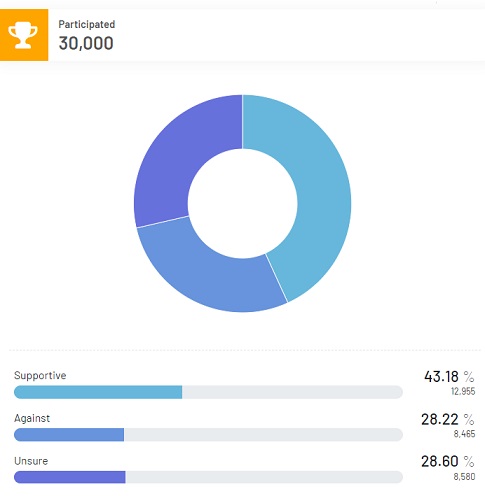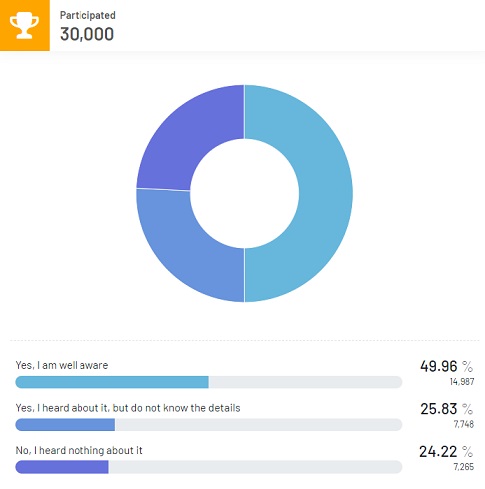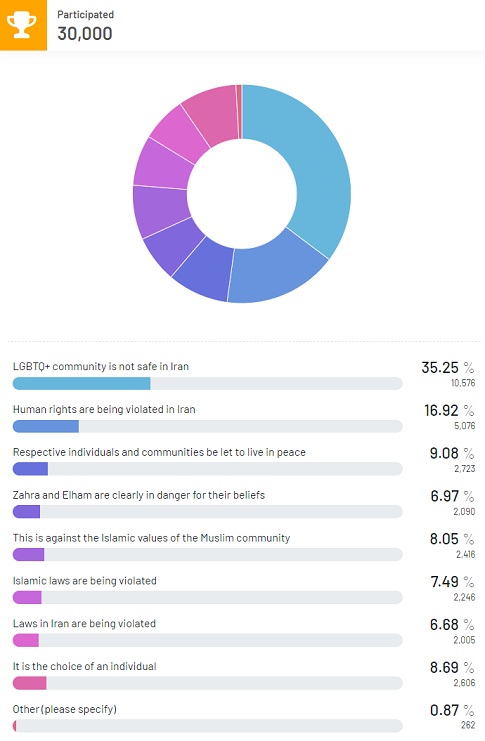 45% Believe That Muslim States Will Legalize the LGBTQ+ Community
45% Believe That Muslim States Will Legalize the LGBTQ+ CommunityFor the first time in Iranian history, two lesbians were sentenced to death. One of the detainees, Sareh, was reportedly arrested while seeking asylum in Turkey near the Iranian border, where a sizeable Iranian LGBT community has been exiled.
Several forms of abuse are faced by members of the LGBTQ+ community surviving in a Muslim society. For this reason, Real Research, an online survey app, launched a survey on Iran sentencing LGBT activists to death.
Highlights:
- 43.18% support the LGBTQ community.
- 49.96% are fully aware of the case of Iranian LGBT activists sentenced to death.
- 45.32% are confident that Muslim states will legalize the LGBTQ community in the future.
How Many Are Against the LGBTQ Community?
The survey on the LGBTQ community starts by asking respondents about their sexual orientation. In response, the majority (45.74%) consider themselves a man. Others label themselves women (15.8%), lesbian (8.28%), gay (8.13%), and bisexual (7.45%). Meanwhile, the rest say they are non-binary (7.26%) and transexual (7.03%).

Afterward, the survey asks about their stance on the LGBTQ+ community. Here, 43.18% support the LGBTQ community, while 28.22% are against them.
Read Also: LGBTQ Discrimination: 31% Believes Enacting a Law Matters
Regarding Iran’s President Ebrahim Raisi’s statement about homosexuality as “nothing but savagery,” 29.15% highly agree. Another 20.85% agree, whereas 13.99% disagree and 12.03% highly disagree.
Iran Sentences LGBT Activists to Death

Iran sentenced two women LGBT activists to death for their links to the LGBTQ community. Regarding this, 49.96% say they are fully aware of it. 25.83% say they heard only about it, whereas 24.22% know nothing about it.
Afterward, the survey asks what respondents believe would be the consequence for Hamedani for speaking about the abuse faced by the LGBTQ community. The majority (37.2%) think she will be granted a death sentence.
Meanwhile, 15.12% think she will face life imprisonment. Some (12.11%) suppose she will get a trial, while others (9.03%) expect she will be found innocent.
Accordingly, the survey asks what respondents feel about the possibility of a sentence to the two women LGBT activists to death. 31.86% stated that they deserve to live peacefully with their preferred identity.
Whereas some (18.97%) think they need human rights interventions, others (11.66%) say they need rescuing. In contrast, some state that the sentence of LGBT activists to death is objective to be punished for violating Islamic laws (9.58%) and Iranian laws (8.51%).
The Life of the LGBTQ Community Surviving in the Muslim States

The survey asks what respondents think about the LGBTQ community surviving in Muslim states like Iran. Here, 35.25% believe the LGBTQ community in Iran is unsafe, and 16.92% say human rights are violated. A distinct 9.08% that the LGBTQ community should live in peace. However, 8.05% say the LGBTQ community goes against Islamic values.
Specifically, homosexuality is illegal and punishable by death under the Sharia penal code in Iran. Among the respondents, 28.82% highly agree, and 19.51% agree with the code. On the other hand, 15.73% disagree, and 12.55% highly disagree.
Lastly, survey results reveal that 45.32% are confident that Muslim states will legalize the LGBTQ community in the future, with the help of international support. 28.66% are doubtful about it but believe that consequences may ease. However, 26.02% dissent it for being against Islamic law.
Read Also: 34% Say It Is Easy for Transgender Models To Succeed in the Fashion Industry
Methodology | |
| Survey Title | Survey on Iran Sentences LGBT Activists to Death |
| Duration | September 22 – September 28, 2022 |
| Number of Participants | 30,000 |
| Demographics | Males and females, aged 21 to 99 |
| Participating Countries | Afghanistan, Algeria, Angola, Argentina, Armenia, Australia, Azerbaijan, Bahrain, Bangladesh, Belarus, Benin, Bolivia,… Brazil, Brunei, Bulgaria, Burkina Faso, Cambodia, Cameroon, Canada, Chile, China, China (Hong Kong) China (Macao), China (Taiwan), Colombia, Costa Rica, Croatia, Czech Republic, Ecuador, Egypt, El Salvador, Ethiopia, Finland, France, Gambia, Georgia, Germany, Ghana, Greece, Greanada, Guatemala, Honduras, Hungary, India, Indonesia, Iraq, Ireland, Israel, Italy, Ivory Coast, Japan, Jordan, Kenya, Kuwait, Kyrgyzstan, Latvia, Lebanon, Libya, Lithuania, Malaysia, Maldives, Maluritania, Mexico, Moldova, Mongolia, Morocco, Mozambique, Myanmar [Burma], Namibia, Nepal, Nicaragua, Nigeria, Oman, Pakistan, Palestine, Panama, Peru, Philippines, Poland, Portugal, Qatar, Romania, Russia, Saudi Arabia, Serbia, Sierra Leone, Singapore, Slovakia, South Africa, South Korea, Spain, Sri Lanka, Tanzania, Thailand, Togo, Tunisia, Turkey, Turkmenistan, Uganda, Ukraine, United Arab Emirates, United Kingdom, United States, Uruguay, Uzbekistan, Venezuela, Vietnam, Yemen, Zimbabwe. |
RR Author
Real Research News is the media platform that presents insights and studies of wide-range of topics. It focuses on insights gathered from its survey app.







